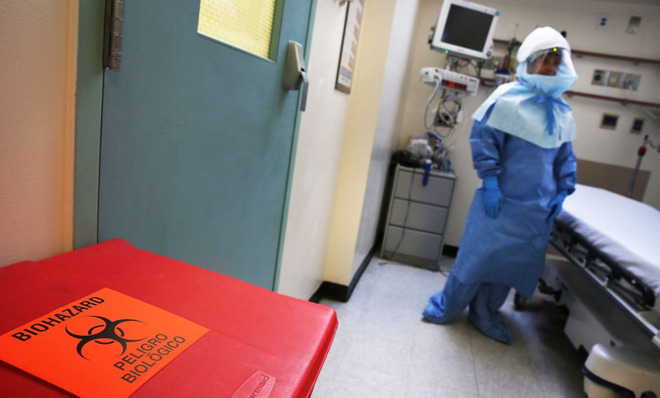Quarantine theater
Quarantining every nurse and doctor who has contact with an Ebola patient would make people feel safer. But here's why it wouldn't work.


A free daily email with the biggest news stories of the day – and the best features from TheWeek.com
You are now subscribed
Your newsletter sign-up was successful
What level of risk to Ebola infections can Americans be expected to tolerate? "Zero" is a comforting answer, especially when an exotic disease has a cinematic impact on the collective imagination. It was in pursuit of zero that Govs. Chris Christie and Andrew Cuomo this week imposed a mandatory, 21-day quarantine on all health-care workers returning to their states from West Africa. The governors say that even if there's an infinitesimal risk that a person without symptoms could pass the virus by, say, sharing a subway car, that risk is too high. Cue the applause. But as we should have learned in the fight against domestic terrorism, a government that seeks to eliminate all potential risk inevitably indulges in "security theater," and makes decisions that later look dumb.
Let's think through where a zero-risk Ebola policy leads. More than 100 health-care workers treated or had direct contact with the two Dallas nurses who contracted Ebola. To ensure public safety, shouldn't those doctors and nurses also be quarantined for three weeks? The same applies to the dozens of Bellevue Hospital staffers now treating Dr. Craig Spencer, who was infected in West Africa. In coming weeks, it's likely that the U.S. hospitals designated to treat Ebola will continue to get a slow trickle of cases; if the dedicated nurses and doctors who volunteer to care for these patients are repeatedly quarantined, they will have no lives, and will cease volunteering. The supply of available nurses and doctors will quickly be exhausted. A manageable crisis will become unmanageable. Ebola poses a real threat, but it's far down on the list of things to fear. Very high on that list: human irrationality, and politicians who pander to it.
A free daily email with the biggest news stories of the day – and the best features from TheWeek.com
The Week
Escape your echo chamber. Get the facts behind the news, plus analysis from multiple perspectives.

Sign up for The Week's Free Newsletters
From our morning news briefing to a weekly Good News Newsletter, get the best of The Week delivered directly to your inbox.
From our morning news briefing to a weekly Good News Newsletter, get the best of The Week delivered directly to your inbox.
William Falk is editor-in-chief of The Week, and has held that role since the magazine's first issue in 2001. He has previously been a reporter, columnist, and editor at the Gannett Westchester Newspapers and at Newsday, where he was part of two reporting teams that won Pulitzer Prizes.
-
 Tourangelle-style pork with prunes recipe
Tourangelle-style pork with prunes recipeThe Week Recommends This traditional, rustic dish is a French classic
-
 The Epstein files: glimpses of a deeply disturbing world
The Epstein files: glimpses of a deeply disturbing worldIn the Spotlight Trove of released documents paint a picture of depravity and privilege in which men hold the cards, and women are powerless or peripheral
-
 Jeff Bezos: cutting the legs off The Washington Post
Jeff Bezos: cutting the legs off The Washington PostIn the Spotlight A stalwart of American journalism is a shadow of itself after swingeing cuts by its billionaire owner
